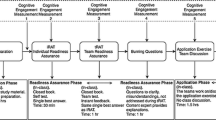Abstract
Objective
This study examines the role of an introductory course in cognitive therapy and the relative importance of trainees’ characteristics in the selection process for an advanced course in cognitive therapy.
Method
The authors assessed the files of all trainees who completed one academic year introductory course in cognitive therapy over the last seven consecutive years (N = 203). The authors examined variables such as previous training, overall involvement during the course, performance, and ability to relate to others, as well as the trainer’s evaluations of their performance.
Results
Interaction skills in group situations and performance in written assignments were better predictors for admission into the advanced course.
Conclusions
Trainees’ abilities to learn and to successfully relate to others in group situations are critical for entering an advanced cognitive therapy training course. These findings question the policy of full-scale training in cognitive therapy based merely on the candidates’ professional background, stressing instead the merits of an introductory course as an appropriate screeningprocedure.
Similar content being viewed by others
References
Alberts G, Edelstein B: Therapist training: a critical review of skill training studies. Clin Psychol Rev 1990; 10: 497–511
James IA, Blackburn IM, Milne DL, et al: Moderators of trainee therapists’ competence in cognitive therapy. Br J Clin Psychol 2001; 40: 131–141
Milne DL, Baker C, Blackburn IM, et al: Effectiveness of cognitive therapy training. J Behav Ther Exp Psychiatry 1999; 30: 81–92
MacKenzie KR, Leszcz M, Abbass A, et al: Guidelines for the psychotherapies in comprehensive psychiatric care: a discussion paper. Working Group 2 on the Canadian Psychiatric Association Psychotherapies Steering Committee. Can J Psychiatry 1999; 44(suppl 1): 4S–17S.
Program requirements for residency education in psychiatry. www.acgme.org/
Yager J, Bienefeld D: How competent are we to assess psychotherapeutic competence in psychiatric residents? Acad Psychiatry 2003; 27: 174–181
Yager J, Kay J: Assessing psychotherapy competence in psychiatric residents: getting real. Harvard Rev Psychiatry 2003; 11: 109–112
Freiheit SR, Overholeser JC: Training issues in cognitive-behavioral psychotherapy. J Behav Ther Exp Psychiatry 1997; 28: 79–86
Margariti MM, Kontaxakis VP, Christodoulou GN: Toward a European harmonization of psychiatric training: the prospects of residency training in Greece. Acad Psychiatry 2002; 26: 117–124
Reichelt FK, James AI, Blackburn IM: Impact of training on rating competence in cognitive therapy. J Behav Ther Exp Psychiatry 2003; 34: 87–99
Author information
Authors and Affiliations
Corresponding author
Rights and permissions
About this article
Cite this article
Pehlivanidis, A., Papanikolaou, K., Politis, A. et al. The Screening Role of an Introductory Course in Cognitive Therapy Training. Acad Psychiatry 30, 196–199 (2006). https://doi.org/10.1176/appi.ap.30.3.196
Received:
Revised:
Accepted:
Published:
Issue Date:
DOI: https://doi.org/10.1176/appi.ap.30.3.196




